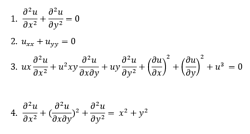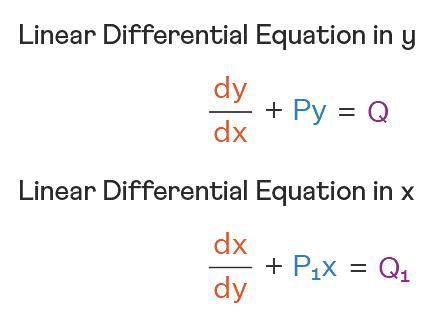The solution of \(
e^{y-x} \frac{dy}{dx} = \frac{y(\sin x + \cos x)}{1 + y \log y}
\)
Solution and Explanation
Solution to the Differential Equation
Given the differential equation:
\[
e^{y-x} \frac{dy}{dx} = \frac{y(\sin x + \cos x)}{1 + y \log y}
\]
Rearrange to separate variables:
\[
e^{y-x} \frac{dy}{dx} = \frac{y (\sin x + \cos x)}{1 + y \log y}
\]
Simplify and Integrate Both Sides:
We separate the variables to set up the integration:
\[
\int (1 + \log y) e^y \, dy = \int (\sin x + \cos x) e^x \, dx
\]
Using Integration by Parts:
The left-hand side can be solved using integration by parts. Let's integrate each part:
\[
\int (1 + \log y) e^y \, dy = \log y \cdot e^y - \int \frac{e^y}{y} \, dy
\]
Right-hand side Integration:
On the right-hand side:
\[
\int (\sin x + \cos x) e^x \, dx = e^x (\sin x - \cos x)
\]
Final Solution:
Combining the results from both sides gives us the general solution:
\[
\log y \cdot e^y - \int \frac{e^y}{y} \, dy = e^x (\sin x - \cos x) + C
\]
Where \( C \) is the constant of integration.
Top Questions on Differential equations
- If \( x = f(y) \) is the solution of the differential equation \[ (1 + y^2) + (x - 2e^{\tan^{-1}y}) \frac{dy}{dx} = 0, \quad y \in \left( -\frac{\pi}{2}, \frac{\pi}{2} \right), \] with \( f(0) = 1 \), then \( f\left( \frac{1}{\sqrt{3}} \right) \) is equal to:
- JEE Main - 2025
- Mathematics
- Differential equations
- Let \( x = x(y) \) be the solution of the differential equation \( y^2 dx + \left( x - \frac{1}{y} \right) dy = 0 \). If \( x(1) = 1 \), then \( x\left( \frac{1}{2} \right) \) is :
- JEE Main - 2025
- Mathematics
- Differential equations
- Let \( y = f(x) \) be the solution of the differential equation\[\frac{dy}{dx} + \frac{xy}{x^2 - 1} = \frac{x^6 + 4x}{\sqrt{1 - x^2}}, \quad -1 < x < 1\] such that \( f(0) = 0 \). If \[6 \int_{-1/2}^{1/2} f(x)dx = 2\pi - \alpha\] then \( \alpha^2 \) is equal to __________.
- JEE Main - 2025
- Mathematics
- Differential equations
- If a curve $ y = y(x) $ passes through the point $ \left(1, \frac{\pi}{2}\right) $ and satisfies the differential equation $$ (7x^4 \cot y - e^x \csc y) \frac{dx}{dy} = x^5, \quad x \geq 1, \text{ then at } x = 2, \text{ the value of } \cos y \text{ is:} $$
- JEE Main - 2025
- Mathematics
- Differential equations
- Let \( y = y(x) \) be the solution of the differential equation \[ \cos(x \log(\cos x))^2 \, dy + (\sin x - 3 \sin x \log(\cos x)) \, dx = 0, \quad x \in \left( 0, \frac{\pi}{2} \right) \] If \( y\left( \frac{\pi}{4} \right) = -1 \), then \( y\left( \frac{\pi}{6} \right) \) is equal to:
- JEE Main - 2025
- Mathematics
- Differential equations
Questions Asked in MHT CET exam
Which part of root absorb mineral?
- MHT CET - 2025
- The Root
- A body of mass 2 kg is moving in a circular path of radius 3 m with a constant speed of 6 m/s. What is the centripetal force acting on the body?
- MHT CET - 2025
- Centripetal forces
- A 200 g sample of water at 80°C is mixed with 100 g of water at 20°C. Assuming no heat loss to the surroundings, what is the final temperature of the mixture?
- MHT CET - 2025
- thermal properties of matter
- Given the equation: \[ 81 \sin^2 x + 81 \cos^2 x = 30 \] Find the value of \( x \).
- MHT CET - 2025
- Trigonometric Identities
- A body of mass 10 kg is at a height of 5 m above the surface of the Earth. What is the gravitational potential energy of the body? (Take \( g = 10 \, \text{m/s}^2 \))
- MHT CET - 2025
- Gravitational Potential Energy
Concepts Used:
Types of Differential Equations
There are various types of Differential Equation, such as:
Ordinary Differential Equations:
Ordinary Differential Equations is an equation that indicates the relation of having one independent variable x, and one dependent variable y, along with some of its other derivatives.
\(F(\frac{dy}{dt},y,t) = 0\)
Partial Differential Equations:
A partial differential equation is a type, in which the equation carries many unknown variables with their partial derivatives.

Linear Differential Equations:
It is the linear polynomial equation in which derivatives of different variables exist. Linear Partial Differential Equation derivatives are partial and function is dependent on the variable.

Homogeneous Differential Equations:
When the degree of f(x,y) and g(x,y) is the same, it is known to be a homogeneous differential equation.
\(\frac{dy}{dx} = \frac{a_1x + b_1y + c_1}{a_2x + b_2y + c_2}\)
Read More: Differential Equations